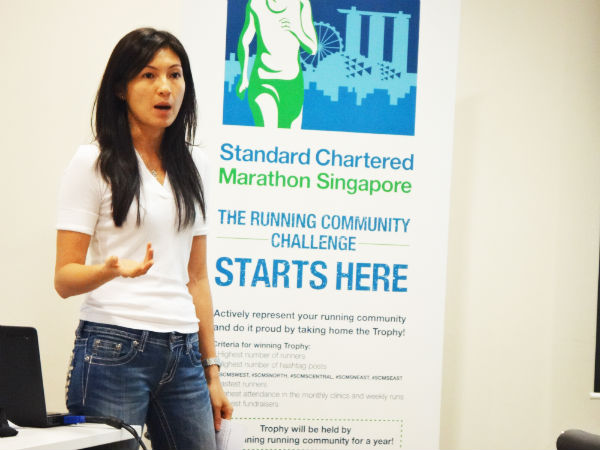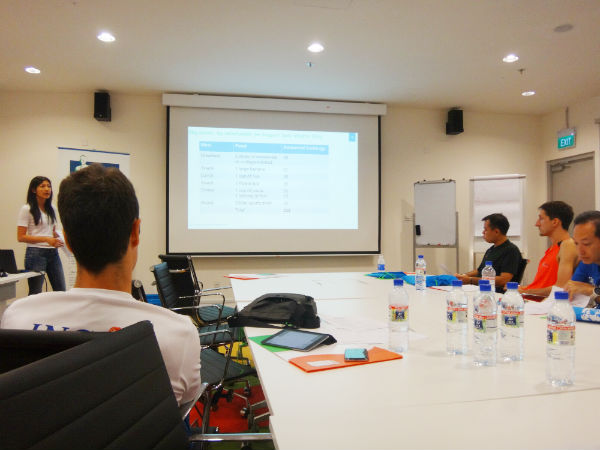Last Saturday, Jon Fong, co-founder of Journey Fitness Company and Jaclyn Reutens, a dietician from Aptima Nutrition and Sports Consultants, shared some tips with runners preparing for the Standard Chartered Marathon Singapore (SCMS) this year – on fuelling and nutrition.
Here are some of the main highlights of their talk.
Running is not simply about fitness
According to Jon Fong, running is not just about fitness. It is about your efficiency to maintain an optimum pace to get the best possible outcome from your race.
Watch what you eat
Watching what you eat is very important to run a good race. That is because if you eat suitable food as a runner, you are giving your body the right fuels and ultimately, this will help you to be able to run better and faster.
However the exact nutrition guidelines vary from person to person though, so there is no one size fits all type of strategy.
The importance of consuming different types of foods
The main purpose of good sports nutrition is to delay the onset of fatigue, according to Jaclyn Reutens.
Proteins
Consuming enough proteins is important because they build and repair muscle and build antibodies.
Proteins come from foods such as chicken, fish, beef, pork, seafood, eggs, nuts, milk, cheese, yoghurt and soya-based items.
Runners should eat 1.2g to 1.6g of protein per kilogram of body weight.
Fats
As fats contain double the calories compared to carbohydrates and proteins, Jaclyn strongly advises runners not to overdo the fats.
But runners should still eat some foods containing fats – namely those high in unsaturated fats, such as nuts, seeds, cooking oils and avocados. Stay away from foods that are high in saturated and trans fats, such as butter and margarine, doughnuts, deep fried foods and fast foods.
Carbohydrates
This is the most important source of fuel for runners because without taking carbohydrates, a runner cannot perform. Carbohydrates are the best source of energy for muscle contraction and brain function. They are converted to – and stored as glycogen in the body.
Carbohydrate supplements are found in the form of sports drinks and gels too and these are especially good for active endurance athletes, such as marathoners, because they provide simple carbs that can give the athlete an immediate burst of energy. If runners eat too little carbs, they will tire very quickly during a race, and hit the wall.
Carbo Loading
Because of the importance of carbohydrates, runners need to go through a process commonly known as carbo loading, between three days to a week before a half marathon or a full marathon race.
This is when runners eat a lot of carb-heavy foods and reduce their training load at the same time. This allows the body to stock up its glycogen stores, to allow runners to compete well and take a longer time to use up the body’s glycogen stores.
Nutrition Before and During your Race
Pre-Race
It is important to consume a light snack or meal that is high in carbohydrates and is easy to digest – on the morning of the race. This should be done two to three hours before the race. These include bananas or liquid drinks. Fruit smoothies with low fat milk are also good and easy to digest.
A sports drink in the morning is also good to top up your glycogen stores, on the morning of the race.
However you should eat a big dinner containing plenty of carbs the night before, for an early-morning race that flags off at say, 5am. This should preferably be refined carbs and not whole grains – for easy digestion. The carbs you consume though can be up to you, such as pasta, noodles, rice or even bread, if you prefer.
For an evening race though, that flags off say, about 6pm, you should eat a light snack at 3pm to 4pm, in addition to your lunch, so that the food has time to digest.
Half an hour to one hour before the race
As the race approaches, runners are advised to take an additional 300ml to 500ml of fluids, preferably in the form of sports drinks, to keep them hydrated while they are running.
During Running
Sports drinks are highly recommended, as they contain six to eight per cent carbs that are easily digestible. These are ideal for runs lasting more than 45 minutes and such sports drinks are better than water because they prevent hypothermia (a dangerous drop in the body’s temperature that may lead to fainting and coma) during endurance events.
Take about 30 to 60 grams of carbs during the run in the form of liquid food and fluids.
Other carbonated drinks such as coca-cola are not recommended though because they can cause stomach problems.
You may also be interested in these other blog posts
Click here for information on other upcoming talks by SCMS.
Click here for more information about race nutrition.
Click here for some marathon running tips by Mok Ying Ren.



Leave a Comment